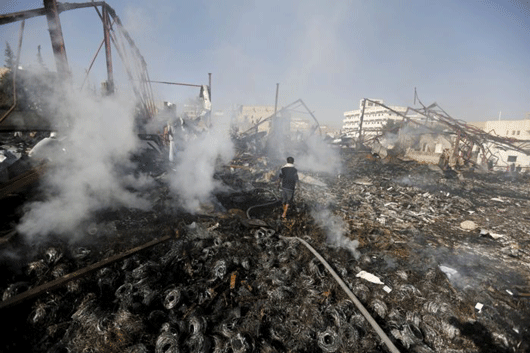
Local Editor
Nearly two weeks after Saudi Arabia announced it would send ground troops to Syria, over 2,500 warplanes, 20,000 tanks and 450 helicopters have arrived at Turkey’s Incirlik airbase and are preparing for operations in Syria.
Riyadh has touted the military exercise that will include troops from 20 nations as "the largest and most important" drill ever staged in the Middle East.
And while it has already been discussed how disastrous Riyadh’s ground involvement in the bloody Syrian civil war could be, a more important - and pressing - Saudi Arabia-related update has emerged from Yemen.
Human Rights Watch has accused the Saudi-led coalition of using indiscriminate U.S.-made cluster bombs in Yemen, a move that clearly violates international law. The munitions, which can maim people long after the initial bombing, were banned in 2008 after a treaty was signed by more than 100 countries. (They accounted for over 92% civilian casualties recorded between 2010-2014.)
"Saudi Arabia and its coalition partners, as well as their US supplier, are blatantly disregarding the global standard that says cluster munitions should never be used under any circumstances," said Steve Goose, director of Human Rights Watch’s Arms Division and co-chair of the international Cluster Munition Coalition. "The Saudi-led coalition should investigate evidence that civilians are being harmed in these attacks and immediately stop using them."
Saudi Arabia has caused more than 2,800 civilian deaths since it launched a military offensive in Yemen against the Houthi Ansarullah movement last March. Despite international condemnation over massive collateral damage - which is a nicer term for war crimes - Riyadh hasn’t ceased its operation.
It is believed the Gulf kingdom is using its so-called ground intervention in Syria as a distraction from troubles closer to home. The theory somewhat makes sense considering Saudi Arabia didn’t think of that before. It has, after all, been almost five years that Syrian civilians have been suffering from the plague of civil and proxy wars.
In less than year after the invasion, roughly 7.6 million Yemenis have become "severely food insecure," according to the Food and Agricultural Organization.
But Saudi Arabia is far from interested in announcing a ceasefire.
Source: News Agencies, Edited by Website Team